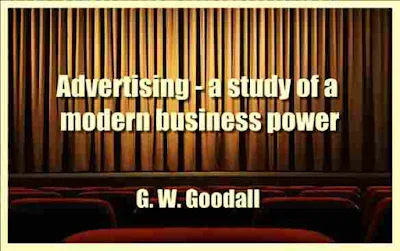Advertising, a study of a modern business power
The student must maintain a firm grip on the actual facts of industry, and the business-man must remind himself of the rules and reason of the " glorious game of business " if each is to contribute his share to what should surely be the object of both — the progressive improvement of our economic organization. If this book, by its descriptions and discussions of one branch of business, is of some little assistance in enabling the " scientist " and the " artist " in economics thus to keep within hail, it will fulfil its purpose.
the book details :Author: Goodall, George William
Publication date: 1914
Company: London, Constable & Co.
Download 3 MB
Whether or not, however, it proves of service to these two — the student and the businessman — it certainly owes much to both— which brings me to the real reason of this Preface, viz., to make some cordial acknowledgements.
The account of modern advertising in these pages is one outcome of a Seminar conducted by Professor Sidney Webb at the London School of Economics, at which plans were made for inquiries into various phases of modern business. In this particular inquiry, besides utilizing some amount of personal experience, I was favoured with inter- views by representatives of practically every side of the advertising business, and each and all showed courtesy and interest and readiness to help, which it is most pleasant to record.
From members of the Seminar, I received many fraternal criticisms, while to Professor Webb I owe a deep debt for his unstinted assistance and encouragement. For any inaccuracies in the book, I must be allowed to claim sole credit.
The business of advertising, on which possibly as much as a hundred minions sterling is annually spent in the United Kingdom, and five or six times as much in the whole civilized world, is a branch of the Nation's organization which is too important to be ignored. Who gets all this money? who spends it? and what does the community obtain from it in return? — ^these are the questions that Mr Goodall sets himself to answer in this useful little book. I do not think that the question of where the cost of advertising finally falls can be said to be yet definitely ascertained or decided to the satisfaction of economists.
It is easy to see that advertised goods are not necessarily, or even usually, more expensive than unadvertised goods. The consumer of much-advertised soap or cocoa, or motor cars, cannot reasonably be supposed to be bearing the very heavy cost of advertising these commodities. Without advertising, they would certainly be no cheaper. Nor is the vendor, on average, at any loss by advertising: on the contrary, it is plainly advertising which builds up many of the largest fortunes made in the business.
More plausible is the suggestion that the expenditure of successful advertisers is really made at the cost of those trade rivals who are distanced, or in many cases ruined, by their more enterprising competitors. The three million pounds which the late T. J. Barratt spent in advertising a particular soap represents, on this hypothesis, the value of the wrecks to which the competition of this giant soap manufacturer has reduced so many small old-fashioned soap-boilers. Not a few staid and respectable carriage builders in county towns, and in Long Acre itself, must have " gone under " in the competition which has brought to the top the successful advertisers of motor cars.
There is no record of ruined businesses, no account of the destruction and waste of capital which, on our present individualist system, the warfare of commerce involves. And the internecine conflict is not wholly between rival commodities of the same kind.
There are such substitutions as bicycles for books, or books for bicycles, according not only to the season of the year but to the strength of the influences that are brought to bear on the purchasers. The consumer's outlay may be diverted, by incessant advertising, from food and clothing to tobacco and Continental holidays; or from current expenditure, good or bad, to the taking out of an insurance policy or the purchase of a house through a building society.
We may regard the advertisers, in short, as struggling both among themselves, and with the non-advertisers, for the contents of the consumers' pockets, and — carrying the matter to the utmost point — for the allocation among different needs and desires of the whole of the nation's income.
Contents:
author's preface ----- - V
INTRODUCTION ------- IX
CHx\PTER I
OUR YEARLY ADVERTISING BILL - - - - i
CHAPTER II
WHO GET THE MONEY? (i) THE NEWSPAPERS - • 7
CHAPTER III
WHO GET THE MONEY? (ii) THE BILL-POSTERS - - I9
CHAPTER IV
WHO GET THE MONEY? (iii) P.O. AND PRINTERS - - 34
CHAPTER V
WHO SPEND THE MONEY? - - - - 43
CHAPTER VI
WHO SEE TO THE SPENDING? - - - - '54
CHAPTER VII
WHY DO WE SPEND IT ? - - - - - "72
SOME BOOKS ON ADVERTISING ----- 90
the book details :
Download 3 MB


